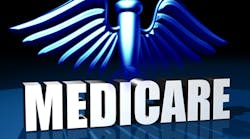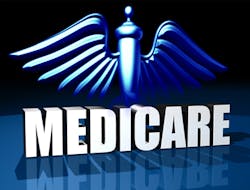Dentists become durable medical equipment suppliers for sleep apnea oral appliances
By Rose Nierman, RDH
Dentists are placing orders for custom oral appliances for Obstructive Sleep Apnea (OSA) at record rates. While a few years ago dentists were reimbursed by a small number of insurers, today the majority of medical insurance companies cover Oral Appliance Therapy (OAT). Improved reimbursement for OAT started on Jan. 3, 2011, when Medicare approved reimbursement for sleep apnea oral appliances.
Medicare, the federal system of health insurance for people over 65 and some individuals with disabilities, had effectively endorsed oral appliances as an accepted treatment for OSA, a very serious condition. Since then, commercial carriers have stepped up by allowing medical insurance coverage for oral appliances. Medicare’s groundbreaking decision — to allow dentists to receive reimbursement — has helped many seniors and health insurance beneficiaries receive treatment for OSA.
Since there is no dental code for oral appliances, these devices are billed through the patient’s medical insurance or Medicare.
For Medicare to cover oral appliances for OSA, specific criteria must be met. The good news is that Medicare does spell out what’s needed in their policy, called the Local Coverage Determination (LCD) for Oral Appliances for OSA. To locate the policy and coding guidelines, search for “LCD for Oral Appliances for OSA” on the Internet.
To become eligible to bill Medicare for OAT, dentists must apply to become a Medicare Durable Medical Equipment (DME) supplier. Most people think of DME as equipment such as wheelchairs, CPAP, or diabetic supplies. So how does DME fit into a dental office? Dentists can become equipment suppliers not for the above mentioned equipment, but for custom oral appliances.
Once you become a DME supplier, a Medicare approved appliance must be used. The information relating to approved appliances can be found at www.dmepdac, where you can search for codes and fees and the DME Product Classification List for medical code E0486.
Medicare facts
• Medicare announced that prefabricated appliances are not covered and only a licensed dentist can bill for custom oral appliances.
• A dentist must become a Medicare Durable Medical Equipment (DME) supplier in order to bill for oral appliances.
• Some commercial carriers have required that dentists have a Medicare DME supplier license in order to receive reimbursement.
• Most dentists sign up as a “nonparticipating” DME supplier so they have the ability to bill patients for the difference between what Medicare covers and their fee.
• Medicare does not reimburse for TMJ/TMD appliances under DME.
• The beneficiary must have a face-to-face clinical evaluation by the treating physician prior to a sleep test.
• Medicare requires a physician written order (Rx) for an oral appliance.
• Commercial carriers have set policies that may be similar to, or differ from, Medicare’s policy.
FAQ’s regarding Medicare’s policy:
1. What must we do to provide Oral Appliances for Obstructive Sleep Apnea to Medicare beneficiaries?
A. In order to submit a valid claim to Medicare for oral appliances, you must enroll with the Medicare program as a Durable Medical Equipment supplier.
2. How do we become a Durable Medical Equipment Supplier?
A. Submit the Medicare Enrollment Application CMS 855S for Durable Medical Equipment, Prosthetics, Orthotics, and Supplies (DMEPOS) suppliers.
3. Must a Medicare approved appliance be used?
A. Effective Nov. 1, 2012, only those appliances and laboratories that have been reviewed through the Medicare’s coding verification review process may be reimbursed.
4. What services are billable to Medicare Durable Medical Equipment (DME) for Oral appliances?
A. The medical code has been established as EO486: Device used to reduce upper airway collapsibility, adjustable, custom fabricated. Includes fittings and adjustments.
5. How long does a Medicare patient have to wait until he or she gets a new OSA appliance?
A. Medicare has a five-year replacement policy.
6. What is the most important thing for dentists to know about Medicare now that it has approved Sleep Apnea Appliances?
A. Documentation is key when dealing with Medicare and medical insurance. Also, there are modifiers that should be used for sleep apnea appliances. The modifier NU indicates that the DME is new (some DME can be used or rented). The Medicare modifier KX is used to indicate that specific required documentation is on file. Using the KX modifier carries a lot of weight because it attests to the fact that the Medicare guidelines are met as stated in the LCD, Medicare Coding Guidelines, and DME supplier standards.
Hundreds of dentists have received their DME supplier licenses to date. How do these dentists make sure that they’re following Medicare guidelines? They become educated about medical insurance and Medicare to ensure that everything required is carefully documented in their records.
The number of patients with Obstructive Sleep Apnea is astounding. The average practice may see up to 440 patients with a high risk of suffering from sleep apnea.[1] Of those patients, 80% to 90% have not yet been undiagnosed.[2]
The great news is that dentists can collaborate with physicians and provide oral appliance therapy for OSA patients who are intolerant to or refuse CPAP, and this helps save lives and relationships. And insurance may have you covered!
-------------------------------------------------------------
RELATED ARTICLES:
Nierman Practice Management acquires Snoring Isn't Sexy
Successful medical insurance billing for dentists
-------------------------------------------------------------
Rose Nierman laid the foundation for dentists billing medical insurance when she wrote the first medical billing for dentistry manual, Successful Medical Insurance in Dentistry, 25 years ago. Over the last quarter century, Nierman Practice Management has led medical billing in dentistry with DentalWriter™ and CrossCode™ software and exceptional training and education. Contact Rose at 800-879-6468 or visit www.DentalWriter.com.
1] Based on an average practice of 1,700 patients, and; "Prevalence of Symptoms and Risk of Sleep Apnea in the US Population" David M. Hiestand, Pat Britz, Molly Goldman and Barbara Phillips; Chest 2006; 130; 780-786
2] Young T, Evans L, Finn L, et al. Estimation of the Clinically Diagnosed Proportion of Sleep Apnea Syndrome; New England Journal of Medicine 1993; 1230-1235







